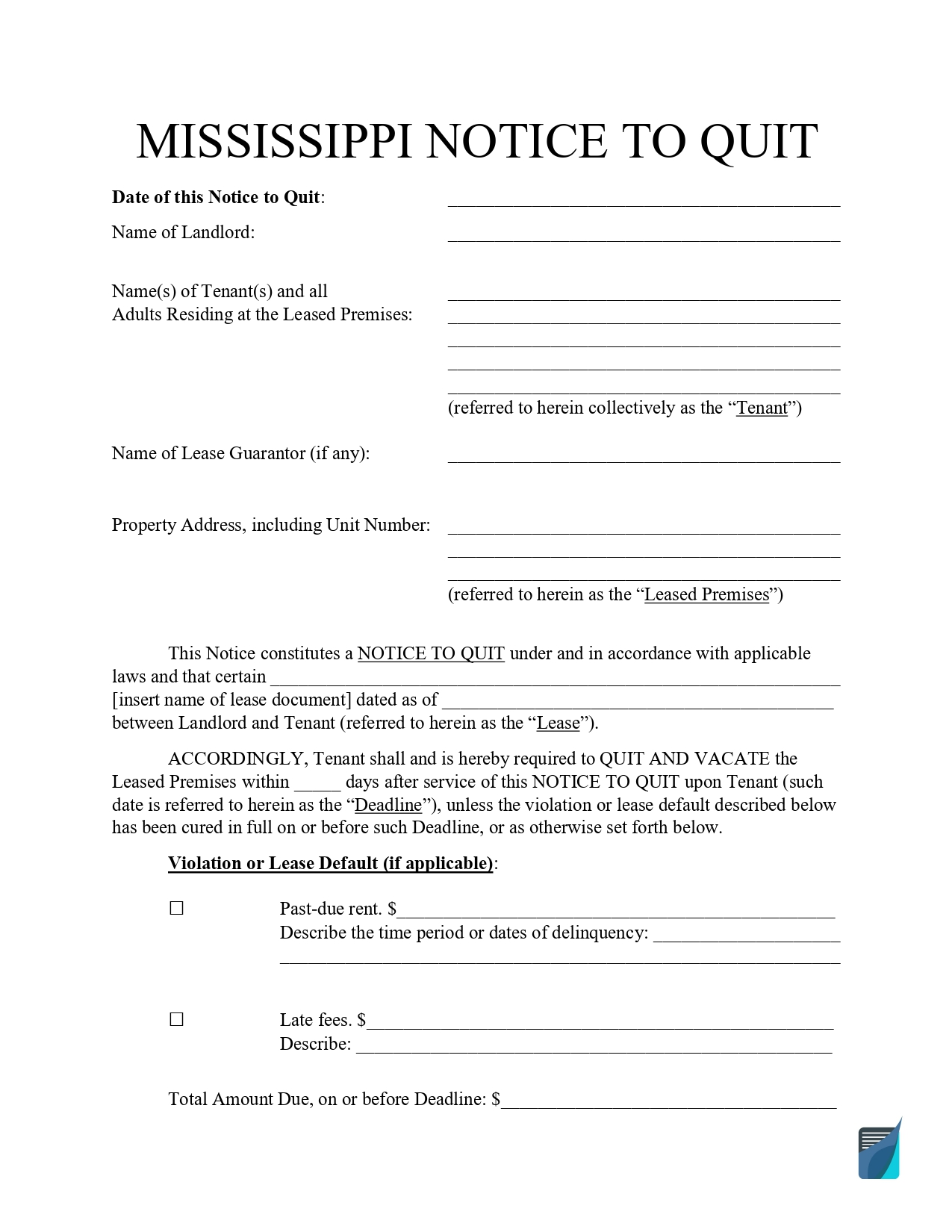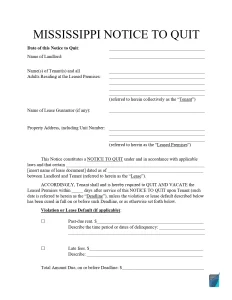Mississippi Eviction Notice Forms
The Mississippi eviction notice is a formal legal instrument landlords use to begin evicting a tenant from a rental unit for lease violations or other legally justified reasons. This document must explicitly outline the basis for eviction, whether due to unpaid rent, failure to comply with lease terms, or other legitimate reasons stipulated by Mississippi law.
The eviction notice form also allocates a designated period for the tenant to address the problem or leave the property, ensuring the process adheres to legal standards. In Mississippi, the duration of the notice period varies based on the nature of the infraction. For example, tenants who fail to pay rent are given a 3-day form, whereas other lease infractions might necessitate a 14-day option.

Build Your Document
Answer a few simple questions to make your document in minutes
Save and Print
Save progress and finish on any device, download and print anytime
Sign and Use
Your valid, lawyer-approved document is ready
Mississippi Eviction Laws
The foundation of eviction laws is outlined in the Mississippi Annotated Code, which delineates specific circumstances under which a landlord or tenant may terminate a tenancy and the requisite procedures. Particularly relevant is Section 89-8-13, which outlines the rights to terminate a tenancy for breaches of the rental agreement and the handling of prepaid rent, security deposits, and abandoned personal property.
If a tenant fails to pay rent as agreed in the lease, the landlord can give them a notice in writing, by email, or text message if that was agreed upon. This notice will state that the lease will end if the rent isn’t paid within three (3) days.
Under Section 89-8-13, if a tenant materially fails to comply with the rental agreement or fails to meet obligations under Section 89-8-25, the landlord may terminate the tenancy following a prescribed notice period. This notice must detail the breaches and provide a remedy period of not more than fourteen (14) days.
Conversely, if the landlord is the party in breach, as outlined under Section 89-8-23, the tenant has the right to terminate the tenancy. Repeated breaches within a six-month period, even after prior notice, allow for immediate termination of the rental agreement, emphasizing the importance of adherence to agreed terms.
Mississippi Eviction Notice Laws Details
| Rent Grace Period | Not Defined |
| Notice of Non-Payment | 3 days |
| Notice of Non-Compliance | 14 days |
| State Laws | Mississippi Annotated Code, Sections 89-8-1 to 89-8-45 |
Eviction Notice Types Used in Mississippi
In Mississippi, different types of eviction notices are used based on the nature of the lease violation.
3-Day Notice for Nonpayment of Rent
The three-day notice is typically employed in nonpayment of rent, as specified in Section 89-8-13(5)(a). It informs tenants that they have three days to pay the rent or the lease will be terminated.
14-Day Notice for Non-Compliance
This notice is used for other lease violations apart from non-payment of rent. If it’s the tenant’s first offense, they have two weeks to address the issue or choose to leave. If the problem isn’t resolved, they must vacate within 14 days.
30-Day Notice for Lease Violations
This notice serves two purposes: it is used for lease breaches unrelated to rent payment and to inform a party that the other party does not intend to renew a month-to-month tenancy. The tenant is given 30 days to correct the violation or prepare to vacate the property, as the lease will not be renewed.

Eviction Process in Mississippi
The structured legal process ensures that the rights and duties of both parties under Mississippi law are upheld, providing a fair resolution to the dispute.
Initial Notice Delivery
The eviction process in Mississippi begins when a landlord delivers a proper notice to the tenant. This notice must specify the reason for eviction and provide a deadline for the tenant to remedy the issue or vacate the property.
Filing the Eviction Suit
If the tenant does not resolve the issue within the notice period, the landlord can file an eviction suit in the local justice court. This legal action formally begins the court’s involvement in the eviction process.
Conducting the Eviction Hearing
During the eviction hearing, both the landlord and the tenant can present their cases. They can bring up any relevant evidence and arguments about the alleged breaches of the rental agreement. The court closely examines adherence to the rental agreement and the Mississippi Annotated Code, particularly sections like Section 89-8-19, which details the terms of tenancy and the required notice periods for termination.
Court Decision and Execution of Eviction
If the judge favors the landlord, a formal order will be issued for the tenant to leave the property within a designated timeframe. This decision considers the evidence provided, compliance with legal notice requirements, and the opportunities given to remedy any breaches.

Use our document builder to customize any template on FormsPal to your preferences. Here is a number of some other widely-used Mississippi forms we provide.
Other Eviction Notice Forms by State